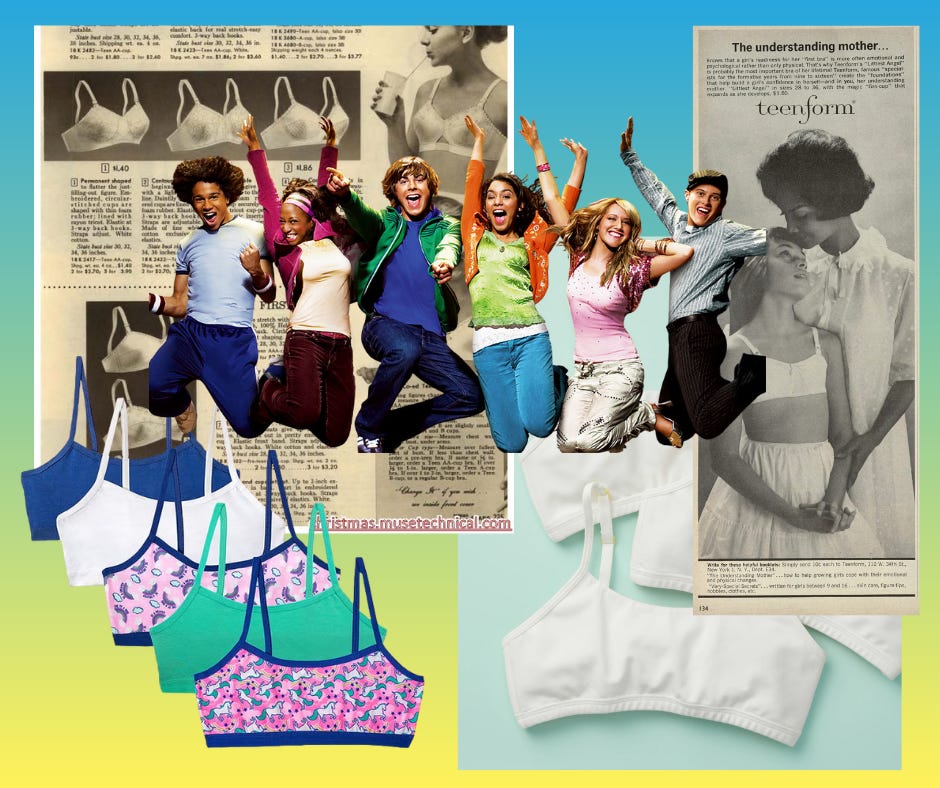"Don’t Look At Me!"
My first experiences with gender envy + the sanctity of the Jewish Deli
Welcome to The Ick, Season 4: DISGUST. This season I’ve invited a brilliant cast of writers and friends to explore what makes us recoil and why.
Season 4 will culminate in a print magazine and live reading in San Francisco. Subscribe here so you don’t miss event info and updates. Every paid subscription helps us cover printing costs.
This week, author Nina Katz reflects on the experience of teenage dysphoria and the relationships—with family and food—that helped them through the darkest moments in the fitting room…
It’s a Saturday afternoon at my suburban hometown’s Jewish Deli and my family and I have just joined the massive line as it spills out onto the sidewalk. I am in the 6th grade, and I am very hungry.
At one point, my mom reaches out to comb my messy hair with her manicured fingertips. I swat her hand away and cross my arms across my chest, feeling my new training bra digging into my shoulders.
She asks, “Did you try that new brand of deodorant I bought for you yet?”
I glare at her, no response. I stare ahead, forcing distraction from the disgust I feel for my changing body and my mom’s interest in it. I’m really looking forward to making it inside; the Jewish Deli is one of those places where I feel most at home. At times, it feels like a more spiritual and sacred space to me than my synagogue.
When we finally make it inside, my spirits start to lift. I immediately notice a handwritten sign hanging from the register reminding customers to place their orders for Passover. I look at my mom and point to the flier, who nods without glancing in my direction.
My wordless demands have gone from “don’t fucking touch me” to “chopped liver, please.”
We are led to a table in the back of the noisy, packed restaurant, smelling of briny pickles and freshly baked loaves of marble rye. At the ripe age of 11, I am well attuned to the terrain of deli menus. There are plenty of kosher delis in my town. And, as I like to remind people, I live just four hours from New York City (three hours and 45 minutes on a good day), where my family makes frequent pilgrimages for smoked sturgeon at Barney Greengrass or pastrami at Katz’s, the deli with which I share a name.
Anyone with the last name Katz will tell you it’s as common a surname as Smith or Lee, but this hasn’t stopped people from asking me my entire life if I am related to those “deli people.”
My go-to deli order is a plate of latkes. My mom totally knows this, so when she asks me if I know what I’m getting, I’m like “yes.” So far she has not respected the sanctity of the deli.
“Do you have a lot of homework this weekend?”
I give up an inoffensive grunt.
“What about the school dance. Are you planning on going?”
I glare again. Obviously I am not going, and instead will be having a sleepover with my friends where we learn the dances from the recently released High School Musical.
Just in time to cut this conversation short, my latkes arrive, glistening like the sun on a cold day. I slather them with their coveted condiments, sour cream and applesauce, and shovel forkfuls of them behind my rows of braces.
I hope that if I keep taking bites of latkes, my moms poking and prodding—which has recently started to bother me more and more—will be kept at bay. Certainly there is nothing left to do but eat.
Unfortunately, I still have half a plate of fried potato in front of me when my mom asks about Matt.
✸
A week before this latke lunch, Matt, a boy at my school, left a message on my home phone asking me to the movies.
My first reaction was confusion.
Matt was one of the most popular kids in my grade, while I was not. To give you an idea on how we differentiated: Matt played on an elite travel soccer team. I played in a rec league. My team was so casual that we didn’t even have a name, just a color, which was yellow.
Though not an exact replica, I would say that Matt was a Zac Efron type—cute by most standards, and what “cool” looked like on Disney Channel. I was a tomboy with curly black hair that was cut so short a group of girls started calling me “Pubes” at sleepaway camp.
I had a few good friends while Matt seemed to be known and liked by the whole school. I think that could be me, but my parents never let me bring a pack of gum to school. A damning rule that barred me from participating in the juvenile economy through which I could have bought myself more friends.
My second reaction to Matt asking me out was mortification. Because, remember what I said about Katz being a common last name? Yes, the first person to ever ask me out on a date had the same last name as me.
Before Matt Katz left me that voicemail, we had only spoken a few times, always in second period English with Mr. Forster, a teacher that got called a fag by some of the 8th graders for the way he stood, leaned against the blackboard, one hip popped out.
Once, sure that sharing a last name was my way to befriend Matt, I asked him, “Have you been to the deli?”
“Mhm,” grunted Matt, as he flipped through the worn pages of his copy of Twelfth Night. That was the end of that.
But after Matt’s voicemail, I was no longer looking for reasons to talk to him. Sharing a last name with a deli is fine, but not with a date to the movies at Montgomery Mall where we might run into kids from school at the food court. What would they think? That we were cousins dating? It’s not like your average 6th grader knows that’s forbidden by the Talmud.
But even more than my fears of judgment, I simply didn’t like Matt like that, nor did I have any crushes on the boys in my grade. Rather, a part of me wanted to be Matt: I would be still a Katz, but sporty and suave, zipped flatly into an Adidas sport jacket embroidered with his jersey number. During gym class, I envied the sweat glistening in the short hair at the nape of his neck, his face glowing red from sprinting up and down the waxed wooden floor.
I wanted to be him, not date him.
Back in the locker room, I changed in the bathroom stall, afraid to put my own body on display for the other girls who seemed to have no problem standing around in just a sports bra.
✸
Just weeks earlier, I quietly sobbed through my first bra fitting at the Friendship Heights Neiman Marcus. Kids cry when they can’t explain why something feels wrong. Tears streamed down my face while I held my arms out in a T like a cheerleader. The sales clerk, Cynthia, wrapped a measuring tape around my ribcage, my armpits and shoulders, and then my bust.
“Ok! All done,” she said, like a doctor removing the needle. The tape zipped back into its roll.
We actually were not all done: I still had to try on bra after bra. I protested having to open the door to show Cynthia how each one fit. In the end, I always lost. The tears pouring hotter, the fire in my stomach burning brighter, as Cynthia stared at my chest and adjusted the straps.
“Not this one,” she’d say kindly, after most of the bras. “Let’s try something better.” But they all felt bad to me.
Once free from the dressing room, I hid a few departments away while my mom purchased my new bras from Cynthia at the counter. I imagined my mom apologizing to Cynthia on behalf of me, her distressed tween. Perhaps she bought a few pantyhose for herself, just to up Cynthia’s commission.
Cursed with a chest that never seemed to stop growing throughout middle and high school, my fittings with Cynthia became a painful once-a-year-ritual. Eventually I was able to hold back my tears, but they were always there, threatening to spill over as I looked at myself in the three paneled mirror, anxiety fizzing in my stomach, and a plea to leave stuck in the back of my throat.
✸
“So did you ever talk to him?” my mom asks at the deli as we eat our lunch.
I blush and shake my head, continuing to fork bites of latke into my mouth. The same confusing, burning feeling I experienced at the bra fitting flooded back in.
I had spent the whole week avoiding Matt. In English class, I was careful to keep my body turned away from his. At lunch in the cafeteria, I didn’t even tell my gossip-hungry friends about the voicemail. Now, at the deli, my holy place, the last thing I want to do is talk about it with my mom, who despite my best efforts, is trying so hard to understand me.
“Do you have any classes with him?” she asks, as I gnaw on the plastic straw sticking out of my emptied glass of pink lemonade.
“I don’t want to talk about it!” I bark back.
“Nina,” my mom pleads, “we are at the deli.”
✸
These days, Matt works as a project manager for a demolition company in our hometown. And I’m across the country perfectly capable of handing out rejections, but unable to shake a disdain for fitting rooms, where a loathing for my chest is alive and well. So, too, is the envy I felt in middle school toward Matt’s boy body. It’s matured as I’ve aged into a furious jealousy when I learn of another friend fulfilling their flat chest dreams.
I’m happy to report my mom and I are super close now. I still have my moments when she asks me if I’ve had anything to eat. If I miss a call from her, I call her back as soon as I can—unlike Matt, who I never called. His simple suggestion that we go to the movies elicited feelings too complicated for me to decode, some that felt too scary to face until more recently.
My mom and I laugh about Cynthia. She says she doesn’t see her at Neiman’s anymore and half-jokes that I drove her to retire. She still asks questions about who I am dating, but now I give her answers. Sometimes I even bring up my various dating successes, or what happens more frequently, the flops. It’s actually easier when my mom takes me shopping. Not just because she pays, but because she helps me pick out clothes that make me feel like me: button down blouses, loafers, jeans, slacks, seersucker, coveralls, and boxy tees. Maybe we stop for latkes at the deli, though as much as I love the deli, I’m not convinced that Katz’s or anywhere else makes them better than my mother.
As I veer further from the type of Katz she may have envisioned me becoming, I never take for granted that I have a mom who hurls love and acceptance in my direction. It’s starting to rub off on me.
Nina Katz is a writer currently based on unceded Tiwa land in Albuquerque, New Mexico. Their debut book of essays, Squelch: A Memoir of Food, Love, and Uncertainty was released by Combos Press in 2024.





